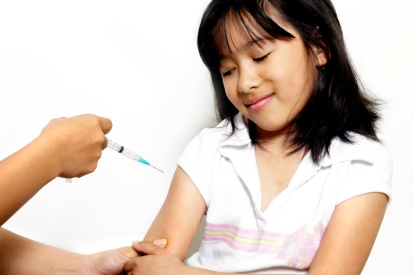 It is a common misunderstanding that the HPV vaccine is just a vaccine to prevent a sexually transmitted disease. While the human papillomavirus, or HPV for short, is a virus transmitted through sexual contact like other STD's, it can lead to cervical cancer, vaginal cancer, vulvar cancer, and genital warts. HPV is also a possible risk factor for many other types of cancer.
It is a common misunderstanding that the HPV vaccine is just a vaccine to prevent a sexually transmitted disease. While the human papillomavirus, or HPV for short, is a virus transmitted through sexual contact like other STD's, it can lead to cervical cancer, vaginal cancer, vulvar cancer, and genital warts. HPV is also a possible risk factor for many other types of cancer.In June 2006, the FDA approved the use of Gardasil, an HPV vaccine, in young women ages 9 to 26. It is currently available at many doctor's offices across the U.S.
Why Should Your Daughter Get the HPV Vaccine?
1. Gardasil protects against two types of HPV that cause 70 percent of all cases of cervical cancer. About 9,700 women in the U.S. are diagnosed with cervical cancer each year, and over 3,000 die from the disease. Gardasil protects against two of the major cervical cancer-causing types of HPV, thus greatly reducing the chances that your daughter will develop cervical cancer.Because Gardasil does not protect against all types of HPV, women who are vaccinated still need to have regular Pap smears to detect any precancerous changes. It is important to note that the HPV vaccine does not replace the Pap smear.
2. Gardasil protects young girls from the two common types of HPV that cause genital warts. Vaccinated girls are protected from the two types of HPV that are responsible for 90 percent of genital warts. Genital warts are cauliflower-like growths that can occur on, within, and around the vagina. The presence of genital warts can be embarrassing for many women and can cause feelings of shame.
3. Vaccinating your daughter will greatly reduce the risk of her developing precancerous and abnormal vaginal and vulvar lesions that could become cancerous. The same types of HPV that cause cervical cancer are also linked to vaginal and vulvar cancer. Although less common than cervical cancer, vaginal and vulvar cancer are very serious types of cancer that can be life-threatening.
----
By Lisa Fayed, About.com Guide
About.com Health's Disease and Condition content is reviewed by our Medical Review Board
- "FDA News." FDA Licenses New Vaccine for Prevention of Cervical Cancer. 08 JUN 2006. U.S. Food and Drug Administration. 1 Nov 2006.
- "Patient Information About Gardasil." OCT 2006. Merck. 1 Nov 2006.
- "Detailed Guide: Cervical Cancer." Key Statistics About Cervical Cancer. 04AUG2006. American Cancer Society. 02 NOV 2006.
- "Vaginal Cancer (PDQ®): Treatment." General Information About Vaginal Cancer. 15SEP2005. National Cancer Insitute. 1 Nov 2006.
- "Vulvar Cancer (PDQ®): Treatment ." General Information About Vulvar Cancer. 16SEP2005. National Cancer Insitute. 1 Nov 2006.
- "National Cancer Institute Fact Sheet." Human Papillomaviruses and Cancer: Questions and Answers. 08JUN2006. National Cancer Institute. 1 Nov 2006.
No comments:
Post a Comment